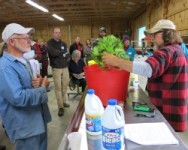Event Details
Date
June 11, 2015
Time
10:00 am - 12:30 pm
Location
Jonas Hershberger's Farm
7468 Albro Road
Gainsville, NY 14886
Cost
$10.00 CVP enrollee
$15.00 Non-CVP enrollee
Contact Lynn Bliven to pre-register
At the Door
$10.00 CVP enrollee
$15.00 Non-CVP enrollee
Printed handout materials may not be available if not pre-registered
Host
CCE Allegany County and Cornell Vegetable ProgramLynn Bliven
585-268-7644 x18
email Lynn Bliven
Post-Harvest Handling of Vegetables for Market
June 11, 2015
Join Cornell Cooperative Extension and the Cornell Vegetable Program's Robert Hadad to learn how to design, build, and operate a small-scale, DIY post-harvest handling system! DIY system will be set up alongside manufactured system for those looking to purchase rather than build a system. This great workshop will focus on the trifecta of good washing and handling - food safety, maintaining high quality and efficiency, and affordability for new and small growers.
The session starts with a discussion and hands-on demonstration of how to design and set-up your wash line, tables, and packing shed, with a focus on safe and efficient product flow to separate “dirty” field harvested produce from the washed and “clean” final product.
Next, we'll look at setting up standard operating practices covering a range of methods of washing produce, including dunking, spraying, and aerating, as well as the why and how of using sanitizers. This session finishes with an examination of clean-up procedures and post-harvest handling considerations, including re- cooling, packing, and storage.
If you want to build, purchase or upgrade your wash lines and post-harvest handling techniques and produce a safer, longer storing product, this workshop is for you!



































